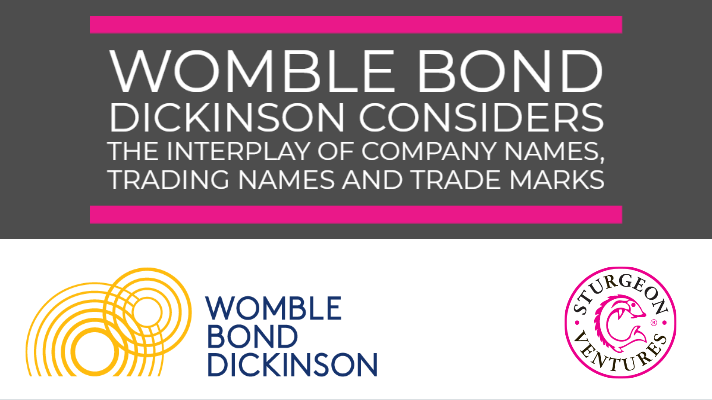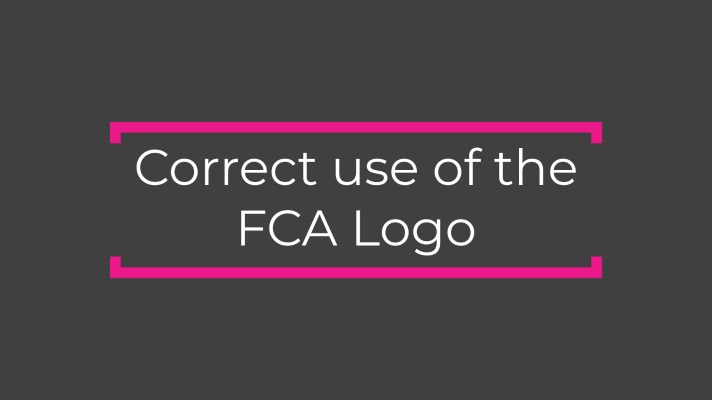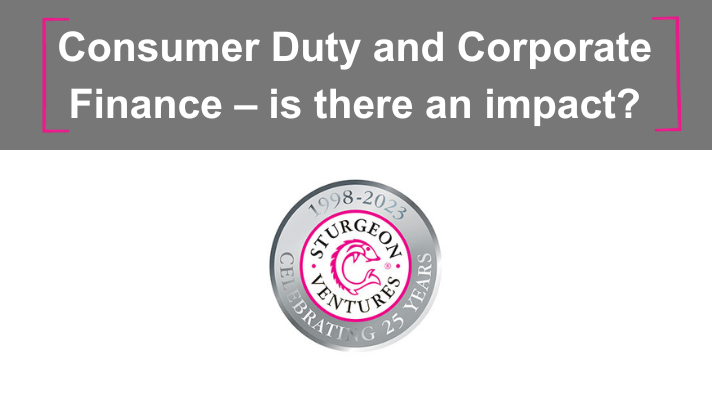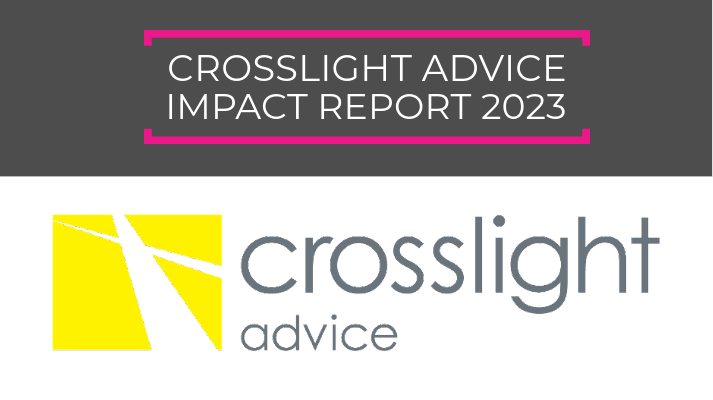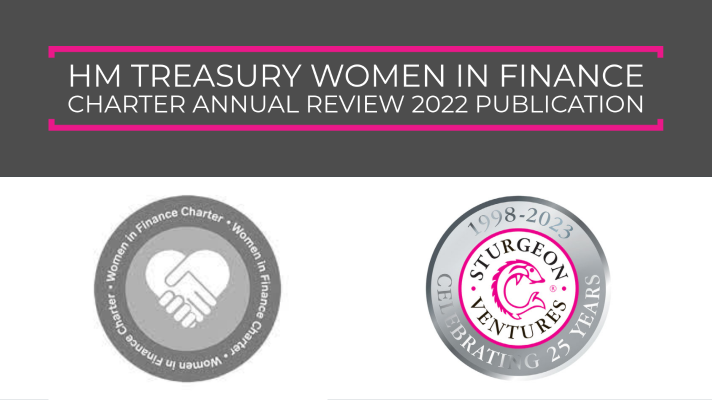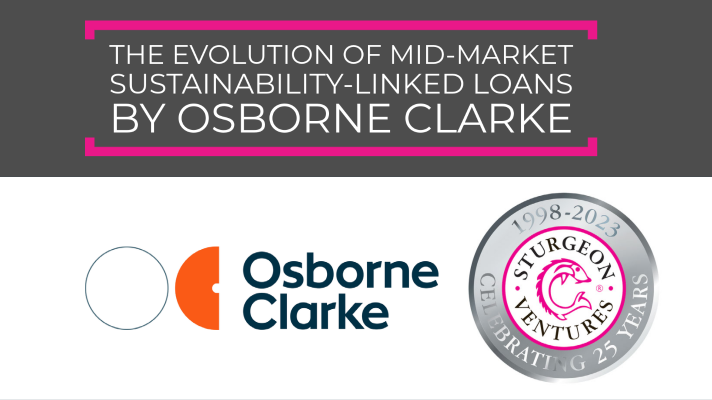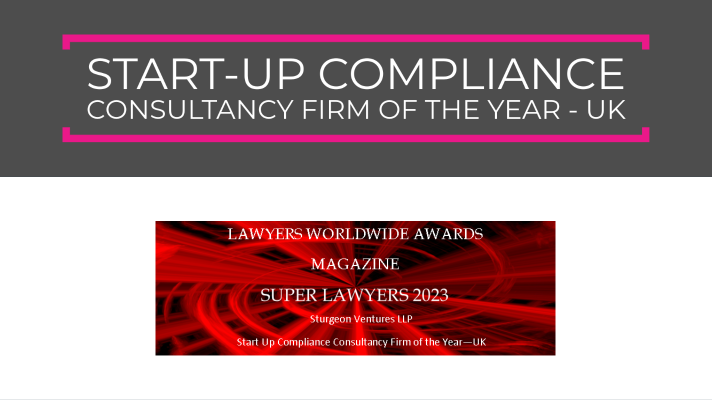Company names, trading names and trade marks
Sturgeon Ventures, after noticing an increase in the number of Financial Conduct Authority (FCA) Regulated Firms which have adopted trading and/or registered company names which are the same as those of established companies, contacted Womble Bond Dickinson in order help identify and explain the possible legal implications.
In this educational note, Womble Bond Dickinson will help FCA Regulated Firms, Appointed Representatives of Regulated Firms and Unregulated Firms appreciate:
- The rules and regulations which govern what can be used in or as a company’s registered name;
- How a company’s registered name can be challenged by a third party;
- The interplay between trade marks and a company’s trading and registered name;
- What corporate information must be displayed by a registered company; and
- The financial regulatory restrictions which may impact trading names and registered company names.
An introduction to Womble Bond Dickinson
Womble Bond Dickinson is ‘…the transatlantic law firm close to home…’. We are a forward thinking practice with the energy, drive and determination to keep pace with our clients and a focus on delivering the relevant services they need. To find out more, please visit our website.
The issues
With increasing frequency, we are having to address new companies incorporating themselves as a private limited company (LTD) or as a limited liability partnership (LLP) and adopting (whether by accident or by design) the same or a similar name or trade mark to what under an existing trader operates. Aside from the general confusion this can cause in the marketplace, which risk of confusion can cause particular difficulties within the financial services industry, incorporation under and usage of these chosen similar names, can conflict with a number of laws and the acts might even constitute criminal offences.
If you own a company, or are planning to incorporate a new company, you need to be aware of these issues.
Companies House
The legislation that governs what names and words may be used in a registered company name in England, Scotland and Wales includes the Companies Act 2006 (CA 2006), the Company, Limited Liability Partnership and Business Names (Sensitive Words and Expressions) Regulations 2014 and the Company, Limited Liability Partnership and Business (Names and Trading Disclosures) Regulations 2015.
Pursuant to this legislation, the Registrar of Companies will not register a company name if, amongst other reasons, it:
- would constitute a criminal offence;
- would be offensive;
- is the “same” as the name of a company that has already been registered; or
- without authority from the relevant authority, would imply a connection with the government, a local authority or certain other public authorities or contains certain words/expressions including “British”, “Council”, “Foundation”, “Trust”, ” Post Office”.
The Companies House website contains a searchable database of existing registered company names which is freely accessible and can be used to identify companies with names which may conflict with the above principles or be too similar to an existing company name.
It is important to note that in the UK, the mere act of registering a company under a particular name at Companies House, does neither, by itself, grant any rights to trade under the name nor prevent third parties from trading under the name. Moreover, if a company’s name is registered at Companies House, it does not mean that the registered company name is free from challenge.
Company Names Tribunal
The Company Names Tribunal is a forum established under CA 2006 which is designed to hear complaints where a registered company name is:
-
- the same as a name associated with a third party in which the third party has goodwill; or
- sufficiently similar to a name that the use in the United Kingdom would be misleading by suggesting a connection between the parties.
If a complaint is successful, the Company Names Tribunal has the power to order the change of the offending company name and to make an award of costs in favour of the successful party. Womble Bond Dickinson has a substantial record of success in obtaining such orders through the Company Names Tribunal.
Financial regulatory restrictions
Where a company carries on “regulated activities” for the purposes of the Financial Services and Markets Act 2000 (FSMA), there are additional restrictions upon the choice of name for operating within this sector. The Companies House restrictions apply equally to financially regulated firms and, in addition, there are certain words that may not be used without specific permission from the financial regulators e.g. ‘bank’. These rules and restrictions apply to trading names as well as registered names.
The Financial Conduct Authority (FCA) permits firms to register any trading names with it, and these names will be searchable on its public register to help consumers to check the identity of those with whom they are dealing . Nevertheless, using too many trading names and/or confusing names may lead to the firm failing to meet the regulatory standard of being “clear, fair and not misleading“. Where an authorised firm fails to meet the standards set out in the relevant Prudential Regulation Authority or FCA Fundamental Rules and Statements of Principle (which require that firms must conduct business with integrity and due skill, care and diligence and pay due regard to the interests and information needs of their customers), it renders itself liable to disciplinary action from the regulators, with potential penalties ranging from a censure, through to a fine and, in the worst case, removal of authorisation.
Any firm that wishes to use certain words in its business name must get the FCA’s view, which will then be taken into account by the Secretary of State under the procedure is described above. The words include “bank,”, “fund”, “insurance” and “mutual” and similar words, which may be misleading if incorrectly used. For example, using the word “bank” for any entity that is not authorised as a deposit-taker.
When a company is choosing what names, or trading names to use and whether or not it is authorised under FSMA, it should consider whether the name may imply it is regulated when it is not, or is regulated for a type of business for which it is not, or whether such name might otherwise mislead or cause confusion. It is a criminal offence to behave or hold oneself out in a manner that indicates falsely that one is authorised under FSMA. If an unauthorised firm uses the same name as an authorised firm, this may lead to the appearance that it is carrying out regulated activities without authorisation, which is also a criminal offence.
Trade marks
In addition to the considerations above about what words and names are permitted to be included/adopted as part of a company’s registered name, it is also prudent to consider the possible impact of registered trade marks and any “unregistered” trade marks that may be attached to trading names. As set out above, the registration of a company’s name at Companies House does not grant any rights either to trade under the name or to prevent third parties from trading under the name.
Registered trade marks
In the UK (and other jurisdictions), trading names, brands, logos and slogans may be registered as trade marks, granting the owner a monopoly over the use of the trade mark in connection with specified goods and services. A registered trade mark may be enforced to prevent a third party from using the same or similar marks in the course of trade without the trade mark owner’s permission.
In addition to granting a monopoly over the use of brand, a registered trade mark can be a great marketing tool and can be attractive to investors. The ‘registered’ ® notice may be used to signify that a mark has been registered. (In the UK, it is a criminal offence to use the ® notice where a trade mark is not registered; instead, the ™ notice must be used.)
If you are considering seeking registration of a trade mark, Womble Bond Dickinson’s specialist teams can advise on the process of identifying, registering and enforcing a trade mark.
Unregistered trade marks
In the UK, in certain circumstances, protection is also granted to traders whose trading names/brands are not registered but where the trading names/brands have goodwill whereupon through extensive usage they have become associated in the relevant consumers’ minds with the goods and/or services of the trader to the exclusion of other businesses. The law of “passing off” grants the owners of such “unregistered” trade marks the ability to restrain the unauthorised use of a mark in which they can demonstrate goodwill where the third party’s use may deceive potential consumers as to the origin of goods and services.
Third party rights
Accordingly, even if there are no financial regulatory or CA 2006 restrictions which might apply to the chosen company name, it is important to consider whether the selection of a registered company name could be challenged on the basis of existing trade mark rights.
Furthermore, if a company begins trading under a registered company name, this may constitute trade mark infringement. If a trade mark owner succeeds in an infringement claim, the losing party may have to pay significant legal costs and financial compensation, as well as being required to fully rebrand. This could cause considerable disruption, especially if a customer base and reputation has been established.
The UK and EU Intellectual Property Offices maintain databases of registered trade marks which are freely accessible and can be searched to give an indication as to whether a registered trade mark exists that is the same or similar to a company’s registered or trading name.
If you are concerned about this issue, Womble Bond Dickinson have experience in advising on such matters, including how to enforce trade mark rights (registered and unregistered) and to address allegations of trade mark infringement.
Trading Names
There is no requirement that a company must trade under its registered company name and many businesses use different trading names, either because they are more marketable or they have grown or diversified into different/complimentary ranges of goods and services.
‘Compartmentalising’ your business
A trading name may be used to help ‘compartmentalise’ a business. If the primary business is, for example, the running of a web design company that is registered with Companies House, a different trading name may be appropriate if complimentary services (such as website hosting) were offered. This may be advantageous to reduce the administration associated with operating multiple registered companies such as the necessary filings at Companies House.
Clear branding
It may be desirable to adopt a different trading name if a company name is common and customers may have difficulty differentiating a business from its competitors. The availability and simplicity of domain names and social media accounts may also impact a decision to use a trading names.
It is important to consider periodically whether trade mark protection or clearance should be sought for any new trading names.
As noted above, FSMA-regulated firms’ use of trading names is subject to the same standards as registered names. In order to minimise the possibility of a trading name being considered to be misleading, firms should regularly check that their names and brands have not been registered by any other person. If they discover a problem, they will need to report it to the regulator, and discuss with the regulator how to address it.
Trading Disclosures
It is relatively easy to incorporate a company in the UK and Companies House neither impose notarisation nor other requirements that always serve to identify, in absolute terms, those promoters behind incorporation and/or the ultimate owners/controllers of such businesses. This risk of secrecy is exacerbated by the even lesser disclosure requirements in other jurisdictions in particular under the regulations of UK and USA overseas dependencies. Nevertheless, within the UK, companies are obliged to disclose certain information so that any persons wishing to deal with the company, can verify the identity of those behind the business. Accordingly, notwithstanding any trading name under which a company might trade, it must include the registered company name, the registered company number and the company’s registered office on all business letters, order forms and websites. However, it is sufficient for this information to appear at the bottom of a letter, website and order forms provided it is visible to the human eye.
There may also be other disclosures that need to be made and specialist advice should be sought in this regard.
Where a firm is authorised or acts as an appointed representative under FSMA, FCA Rules require that status and other regulatory disclosures are made on key customer communications. These disclosures sometimes take a prescribed format, and must always meet the test of being clear, fair and not misleading.
Resources
Companies House (company search) – https://beta.companieshouse.gov.uk/company-name-availability
UK Intellectual Property Office (trade mark search) – https://www.gov.uk/search-for-trademark
EU Intellectual Property Office (trade mark search) – https://euipo.europa.eu/eSearch/
Companies House (guidance on registered names) – https://www.gov.uk/limited-company-formation/choose-company-name#content
FCA Principles for Business: https://www.handbook.fca.org.uk/handbook/PRIN/2/1.html
FCA guidance on Sensitive Business Names: https://www.fca.org.uk/firms/firm-details/sensitive-business-names
Key contacts
| Patrick Cantrill
Partner Intellectual Property T: +44(0) 113 290 4464 |
Barry Stimpson
Partner Corporate Finance T: +44(0) 207 788 2505 |
| Tim Barber
Solicitor Intellectual Property T: +44(0) 113 290 4308 |
Emma Radmore
Legal Director Financial Regulation T:+44(0) 207 788 2372 |
You might like to read
Seonaid Mackenzie comments on the FCA FMCR Regime in Hedgeweek
FCA Review of Principal Firms – Investment Management


